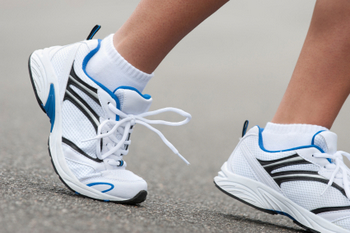Neuromuscular Warm-Up Reduces Girls’ Sports Injuries
 |
Today’s athletic high school girls “got game” on the basketball court and soccer field, but they are at a greater risk for sports-related knee injuries than their male counterparts.
In a new study from Northwestern Medicine, focused on predominantly low-income, urban female athletes in Chicago Public Schools (CPS), researchers were able to significantly reduce common non-contact, sports-related injuries by implementing a coach-led neuromuscular warm-up routine before practices and games.
The study, published in the Nov. 7 issue of the Archives of Pediatrics & Adolescent Medicine, found that the neuromuscular warm-up, designed to strengthen targeted muscle groups and improve motor control of lower extremities, led to a 38 percent reduction in ankle sprains, a 30 percent reduction in knee sprains, and a 20 percent reduction in ACL injuries in female soccer and basketball players.
“Chicago public high schools don’t have athletic trainers to evaluate injuries and advise coaches about proper warm-up techniques,” said Cynthia LaBella, MD, associate professor of pediatrics at Northwestern University Feinberg School of Medicine and medical director at the Institute for Sports Medicine at Children’s Memorial Hospital. “The athletes tend to have limited access to medical care, too, so that’s another reason why it’s so important to train these coaches and try to prevent injuries in this population.”
The key components of the warm-up are: core and lower extremity strengthening exercises (e.g., squats, lunges, planks, and prone lifts), to balance strength evenly between quadriceps and hamstrings and between right and left legs, and progressive plyometric jumping exercises, to improve neuromuscular control of knee motion during landing and cutting maneuvers.
“Verbal feedback from the coach to the athlete on how to recognize and avoid unsafe knee positions was also a big part of the intervention,” said LaBella, lead author of the study. “If you repeat an exercise with bad form, it is not going to help.”
Ninety of CPS women’s soccer and basketball coaches and nearly 1,500 female student athletes completed the study during the 2006-2007 school year. Schools were randomized into control and intervention groups.
Coaches from the intervention groups attended a two-hour training session that taught them how to implement the full warm-up at team practices and an abbreviated version before games. They also received a DVD with narrated videos of the exercises and a laminated card listing the order and frequency of the exercises. Coaches in the control group were told to perform their usual warm-up and were offered the same training as the intervention group after the study was completed.
“The findings suggest that neuromuscular training should be routine in girls’ high school soccer and basketball,” LaBella said. “And implementing it is feasible in predominantly low-income, urban populations, such as the one studied. It will take some effort on the part of coaches to learn the warm-up and incorporate it into their usual practice routines, but the reduction in injury rate is worth the effort.”
The program would be cost-effective as well. To avoid one knee injury resulting in surgery, 189 athletes would need to be exposed to the warm-up, LaBella said. That equates to training approximately 13 coaches, which would cost about $1,000, substantially less than the cost for one knee surgery, which typically costs $20,000, LaBella said.
This study was funded by grants from the Children’s Memorial Research Center and Office of Child Advocacy.
|
Members of the media, please contact Erin White via e-mail or at (847) 491-4888 for more information about this story. |






